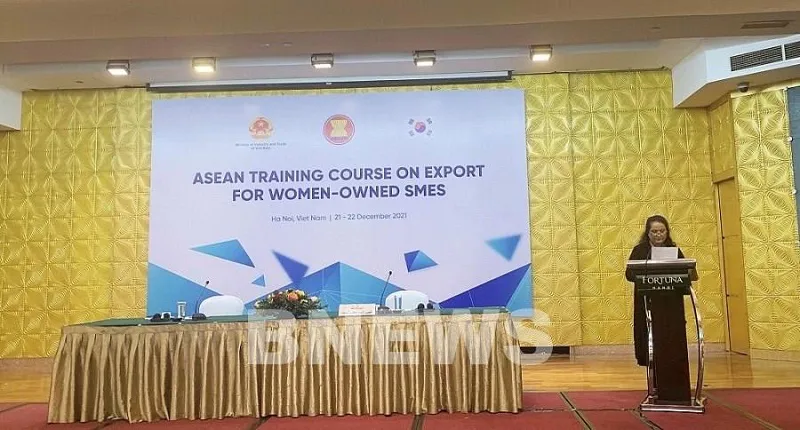ASEAN governments to promote development of women-owned SMEs
The development of e-commerce and digital logistics will help female entrepreneurs start their own businesses at home and easily export goods to foreign countries.
ASEAN governments should build policies to further promote the development of women-owned small and medium enterprises (SMEs).
| An overview of the workshop. Photo: VNA |
At the workshop “ASEAN training course on export for women-owned small and medium-sized enterprises” on December 21, experts said it is necessary to encourage the participation of women in the digital economy by providing support services for SMEs while enhancing digital capabilities and encouraging the use of information technology tools.
Mai Thi Thuy, Chairwoman of the Hanoi Association of Women-Owned Small and Medium Enterprises (HAWA SME) said local authorities need to create policies to support SMEs in accessing financial tools.
These policies include developing credit guarantees to make it easier for businesses to get loans, reducing barriers to access finance for SMEs, promoting the use of different financial channels such as peer-to-peer lending and crowdfunding.
Ho Quang Trung from ASEAN Secretariat, said the majority of women-owned businesses in ASEAN are still concentrated in low-value and low-skilled sectors, mainly in the informal sector.
However, the post-pandemic period can open up many opportunities for female entrepreneurs. Therefore, the development of e-commerce and digital logistics will help female entrepreneurs start their own businesses at home and easily export goods to foreign countries.
In particular, as the Regional Comprehensive Economic Partnership (RCEP) comes into force in 2022, it will promote trade exchanges between member countries. This will be a huge opportunity for women-owned businesses, he added.
Another opportunity for them is the change in demand for goods. The pandemic has changed consumer behavior towards the consumption of healthy products. This is an opportunity for female entrepreneurs to change their business models and thrive.
Trung added ASEAN countries could develop policies to make it easier for women-owned SMEs to access foreign markets such as: promoting regulatory harmonization and the application of more flexible rules of origin, as well as enhancing regional cooperation among small and women-owned businesses.
According to recent research on Vietnamese and ASEAN SMEs in the context of the Covid-19 pandemic, which was conducted by the Economic Research Institute for ASEAN and East Asia (ERIA), women-owned SMEs are key to driving a comprehensive economic recovery across the world. In particular, ASEAN women need access to skills, training, and capacity building to participate in regional value chains.
The research also showed that, in recent years, the number of women entrepreneurs has been steadily increasing in ASEAN, with more than 60 million women owners across the region. However, the pandemic and global economic crisis have been threatening their development.











